Art at the Port
Art on the waterfront reflects the charm and beauty of the city and communities. Some art moves with the wind and tides and show how the waterfront has changed over the years.
Our Public Art Program invites artists and communities to get involved.
Big Art Loop
The Big Art Loop is a 34-mile route across San Francisco that showcases 100 large-scale sculptures. Several sculptures are on the Port waterfront and are easy to visit by walking or biking.
Permanent Waterfront Art
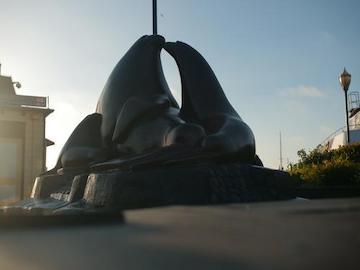
Guardians of the Gate
Artist: Miles Metzger
Location: West Park adjacent to PIER 39
A bronze sculpture that depicts a family of sea lions in loving embrace. Installed in 1991, dedicated in 1992.
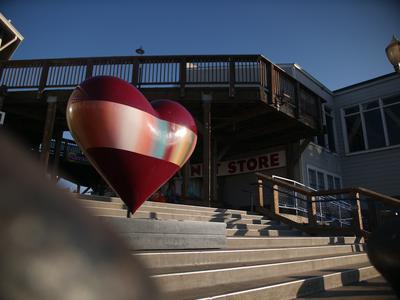
Open Heart
Artist: Patrick Dintino
Location: Bay end of PIER 39
This sculpture is part of San Francisco General Hospital Foundation’s 2014 “Hearts in San Francisco” collection that supports the vital programs and initiatives of San Francisco General Hospital and Trauma Center. Local artist Dintino is a San Francisco native whose mother’s life was saved more than a decade ago by open heart surgery. Installed in 2014.
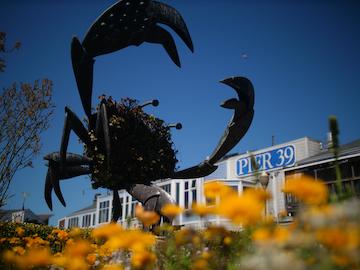
Crab Topiary
Artist: Jeff Brees
Location: PIER 39 main entrance
The much-photographed Crab Topiary, with its living body and extended claws, has become a familiar piece at the head of PIER 39 and Fisherman's Wharf. Installed in 2003.
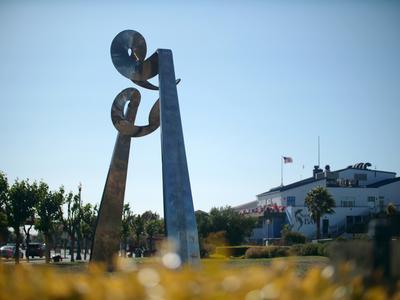
Skygate
Artist: Roger Barr
Location: PIER 39 East Park Lawn
A stainless steel structure, with an upright arch culminating in three helix shapes with a highly polished surface which reflects its surroundings. This sculpture is meant to be walked around, viewed from all sides as well as from underneath. Installed in 1984, dedicated in 1985.
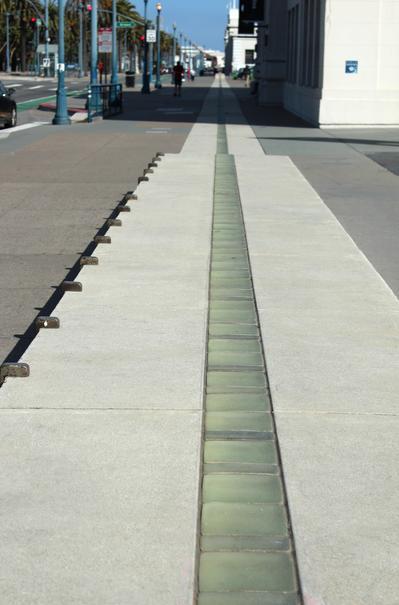
Promenade Ribbon
Artist: Vito Acconci, with Stanley Saitowitz and Barbara Solomon
Location: The Embarcadero between North Point and Townsend Street
This 2.5-mile long, 5-foot wide linear sculpture consists of concrete, glass blocks, and fiber optic lighting integrated into the design of the bayside pedestrian promenade. The work is a symbol of the juncture between the city and bay, commemorating the historic seawall and the water beneath the sidewalk. Installed in 1996.
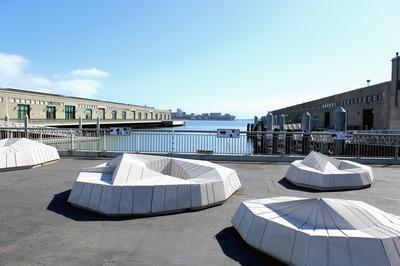
Barnacles
Artist: Surface Design
Location: The Embarcadero between Pier 9 and Pier 15
Benches were created using barnacles as a theme conceived to reflect the natural history of the waterfront and the tendency for people to cluster together, like barnacles. Installed in 2015.
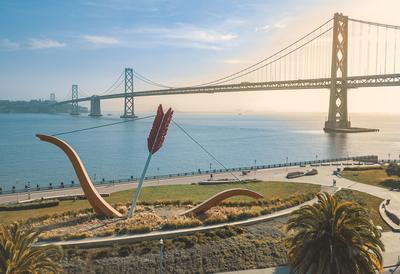
Cupid's Span
Artist: Coosje van Bruggen and Claes Oldenburg,
Location: Rincon Park
This installation was commissioned by GAP founders Donald and Doris F. Fisher. Constructed of fiberglass and steel, the piece resembles Cupid's bow and arrow, with the arrow drawn and the bow partially submerged in the ground. The piece was originally inspired by San Francisco's reputation as the home port of Eros, the Greek god of love. Installed in 2002.

BOW
Designer: Hood Design Studio
Location: SF Fire Station No. 35 at Pier 22 1/2
BOW features at its center a series of glass panels that combine images and quotations to illuminate the cultural importance of Fire Station No. 35. The collage layers historic images of fireboats, historic maps and the Bay with narratives from people who experienced the Loma Prieta Earthquake and the life of the crew of Fire Station No. 35. Serving as backdrops to BOW are the new fire station, the San Francisco Bay and the Bay Bridge. The effect is a three-dimensional living collage that showcases the fire station and its role in shaping the cultural landscape and history of the City.
The surrounding concrete pier deck will be sandblasted with images from navigational charts. BOW - the curved shaped associated with the front of a boat - is multi-dimensional in its interpretation. As a sculpture, it can be experienced from all around and from within. It is a homage to the fire boats and their role in the cultural history of San Francisco and the Bay, especially regarding their significant contributions during and after the Loma Prieta Earthquake. The commemorative collage at the keel focuses the experience of the overlook on the Fire Station history and narratives from citizens who experienced the earthquake. Installed in 2021.
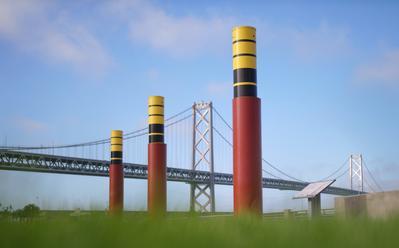
Tidal Columns
Architect: Dan Hodapp and Steven Reel (engineer)
Location: Brannan Street Wharf Park
The tidal columns rise and fall with the bay tide. The stripes on the top of the columns indicate the height of the tide in feet. Columns move throughout the day with the natural high and low tides. Extreme tides can swing by more than eight feet from high to low. Installed in 2013.
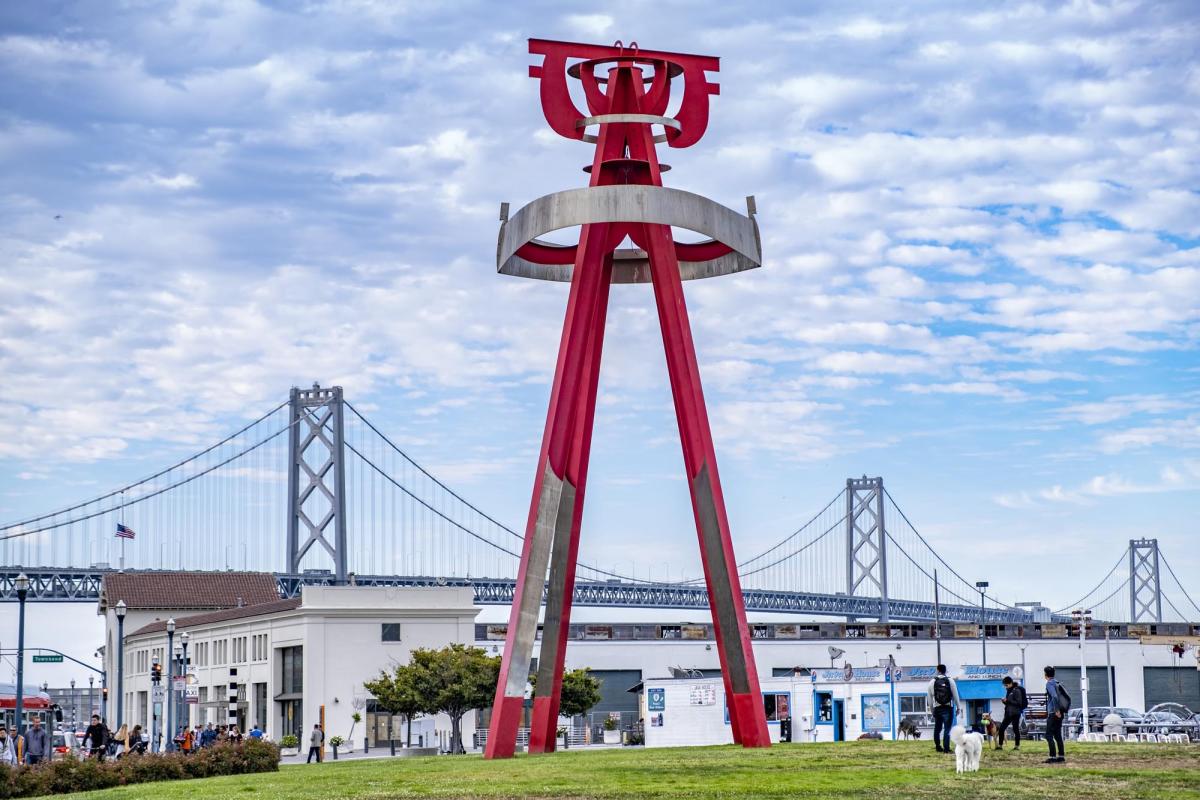
Sea Change
Artist: Mark di Suvero
Location: South Beach Harbor Park
The red, triangular steel sculpture is 70 feet high and weighs 10 tons. The circular top moves in the wind as an elegant, kinetic sculpture sitting at the gateway to the South Beach waterfront. Installed in 1995.
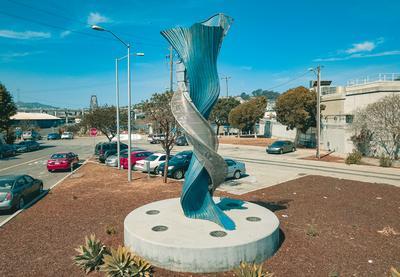
Islais
Architect: Cliff Garten
Location: Third Street and Arthur Avenue
The vibrant blue bronze and stainless-steel sculpture stands 20-feet tall and references the shape of the estuary with its different outlets before Islais Creek became a single channel. The stainless-steel wrap of the Islais sculpture was created by using the shape of the original coastline that explorers found as the profile for the rods at the bottom of the form, and the most recent shape of the mouth of the Creek as the profile of the rods at the top. Installed in 2018.
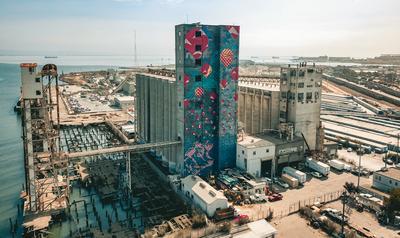
Bayview Rise
Artist: Laura Haddad and Tom Druggan
Location: Pier 90
The 197-foot mural installation weaves together iconic imagery reflecting the Bayview neighborhood’s changing economy, ecology, community and history. It forms a 'gateway' into Bayview Hunters Point and is highly visible, changing from day to night as dynamic, projected lighting is cast upon it. Visit the artist's website for additional information about the mural. Installed in 2014.